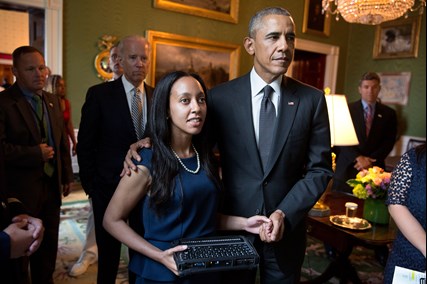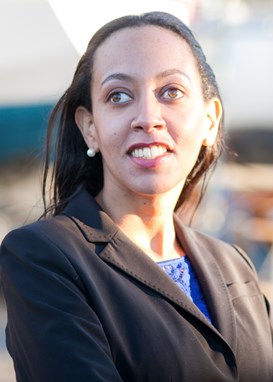5 Minutes With... Haben Girma
 When did you decide to become a lawyer? Why?
When did you decide to become a lawyer? Why?
As a Deafblind student in college, I witnessed advocates using the Americans with Disabilities Act (ADA) to change social attitudes. The National Federation of the Blind regularly referenced the ADA when explaining to technology developers why designing access for people with disabilities is a necessity and not some optional cherry atop the Silicon Valley sundaes. I heard how the National Association of the Deaf used the ADA to increase closed-captioning online, and how Disability Rights Advocates used the ADA to compel Target's tech team to make their website accessible to blind Americans.
Impressed by the success of the advocates, I felt inspired to join them. Back then, and even now, I encountered so many barriers in the digital world. Not because of my disability, but because of attitudes among tech developers that trivialize access for people with disabilities.
Starting out, what did you expect from a career in the law?
I expected to use my legal career to increase access to information for people with disabilities, and I’m successfully doing just that. A career in law allows me to work towards ending the information famine, rendering accessible the digital works that formerly had access barriers. Working on the Scribd case has thus been personally and professionally rewarding.
As the first Deafblind graduate of Harvard Law School, what skills did you learn as a student that you were able to carry forward into your legal career?
Law school teaches valuable advocacy skills, and I regularly use the skills I developed in school. My favorite class was negotiations because that’s where I developed and practiced the art of negotiation.
"Negative stereotypes and attitudinal barriers hold
the legal field back."
You've worked tirelessly as an advocate for disability rights. What in your opinion should law firms be doing to promote the recruitment of people with disabilities?
Negative stereotypes and attitudinal barriers hold the legal field back. Educating law firms, spotlighting lawyers with disabilities, and including disability in diversity training will help us move in the right direction. As a first step, please sign and circulate the American Bar Association’s Pledge for Change: Disability Diversity in the Legal Profession, http://www.americanbar.org/groups/disabilityrights/initiatives_awards/pledge_for_change.html.
Where should law firms be investing their money in order to best alleviate the challenges faced by their disabled employees?
Lawyers with disabilities are diverse, and most disability accommodations cost very little. Law firms should work to create inclusive environments where all employees can contribute their talents. Law firms should invest in diversity training, removing architectural barriers, and accessible digital services.
What advice would you give to someone with a disability who is hoping to go into a career in law?
Individuals with disabilities who are considering law school should reach out to law students and lawyers with disabilities to seek advice and learn strategies. Consider joining organizations for lawyers and law students with disabilities, too.
"Law firms should invest in diversity training, removing architectural barriers, and accessible digital services."
You've obviously achieved a huge amount, but what single achievement are you most proud of?
Working to increase access to Scribd’s large library has been both personally and professionally rewarding. I’m excited to gain access to more digital services for the disability community.
What do you consider your greatest failure or regret?
Although I spent many hours practicing, my dancing with the Harvard Ballroom Dance Team never won me an award. I really love dancing, so I wonder sometimes where I would be now if I devoted more time to dancing.
What have you enjoyed most during your career in the legal profession?
My clients and colleagues are absolutely fantastic. I really enjoy spending time with people who believe in access and inclusion as much as I do.
And enjoyed least?
Litigation often takes a long time. I would love for positive changes to happen quickly.
What law would you change, abolish or create?
I would like to see the US develop a national program for selecting, hiring, and covering the cost of interpreters that would allow Deaf Americans greater access to their local communities.
Who is your legal hero?
Daniel Goldstein is an extraordinary attorney who has won many victories for the National Federation of the Blind.
You recently helped achieve a legal victory in National Federation of the Blind v. Scribd, meaning Scribd will now reprocess its literary content to include accessibility features. What's the next big project on the horizon?
The vast majority of websites and apps have access barriers, so I plan to continue working to increase access to digital information.
More generally, what is your long-term career plan?
Long-term, I plan to continue working to increase access to digital information.
Finally, what slogan would you like to be remembered by?
"We all have the ability to make our world more inclusive."